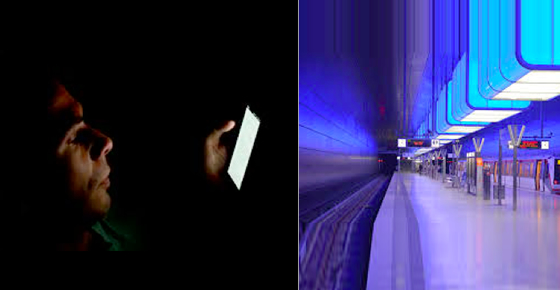
It is not something really new anymore: exposure to blue light, especially at night time, can mess you up pretty bad. On a previous post, I talked more in depth about the differences and effects of light colors on the human body. But in short, exposure to blue light wavelengths at night can disrupt your biological clock, the circadian rhythm, which normally regulates your sleep, hormones, mood, and much more. The problem is that now, many of us end up the day by getting to bed, usually late, and have our eyes focus on a screen (TV, tablet, or cell phone) which is an important source of blue light. Other sources of blue light are LEDs, fluorescent and incandescents bulbs which, even though they look white, have their peak emission in the blue wavelength range (400-490nm). In short, we are overexposed to blue light, and that can be bad news.
Dangers of overexposure of blue light:
First there is the not so surprising: too much of blue light exposure has been linked with retinal damages, macular degeneration, and accelerated aging of the skin. But that’s not all. At night, our circadian rhythm automatically lowers our cortisol levels, allowing us to fall and to stay asleep. Since the longest time, we humans are wired so that we sleep when it’s dark outside. The usage of electricity already affected our sleep by extending the time we stay awake at night, causing some disruption in our circadian clock and elevating the cortisol as well as other hormones levels. But now, with the invention of smartphones and tablets, we tend to stay even longer exposed to an even greater source of blue light, causing further dysregulation of our circadian rhythm and hence further hormonal imbalances, leading to more severe health consequences. Studies have possibly linked circadian rhythm disruption with cancer, diabetes, obesity and heart diseases, depression and anxiety. In other words, pretty much all the most important health concern of today’s society.
Blue light shield:
This demonization of blue light source gave birth to multiple commercial tools and devices designed to suppress that blue light exposure. It is now pretty common to see someone using a blue light filter on the computer desk, a smartphone app that gives a reddish appearance of the screen, or blue light blocking glasses. And of course, those brands (and health celebrities paid by those brands) make sure to tell us that we should use those filters at all time in order to live longer and healthier. The more blue light we avoid, the better it is. But that is definitely not the case.
Blue light is not always bad
If it is true that exposure of blue light at night, i.e. when cortisol level should be low, is not good. There are moment in the day that blue light is actually essential for our wellbeing. Specifically in the morning, when our cortisol level is supposed to raise and be at its highest level of the day. At that moment, low exposure to blue light is actually associated with depression, just the opposite as night time!
Decrease in suicides in Tokyo subway stations
If you have traveled to Japan, you might have heard that the rate of suicides is quite high over there. One of the most popular way to end one’s own life is to jump from the platform directly in front of the subway. Interestingly, Japanese researchers noticed that this way of committing suicide was extremely prevalent during the morning commute. Concerned about decreasing the suicide rate (or more likely reducing subways delays- it takes about 10 minutes to clean a suicide scene and get the subway back on track, extremely quick for our standards but apparently too long for the salarymen and students in a rush to make it on time), scientists decided to put LED blue light on Tokyo’s subway stations in the morning and the suicide rate decreased by 84%!
At the end of the day, nothing beats sunlight
The problem is that most of us don’t get enough sun exposure during the day, and too much artificial exposure at night time, leading to all those self-inflicted illnesses. Even with a busy and disconnected light, we should at least try to get as much sun exposure as possible, especially in early morning, and avoid to use any screen after sunset.
Sources:
Tosini G, Ferguson I, Tsubota K. Effects of blue light on the circadian system and eye physiology. Mol Vis. 2016;22:61–72.
Arjmandi N, Mortazavi G, Zarei S, Faraz M, Mortazavi SAR. Can Light Emitted from Smartphone Screens and Taking Selfies Cause Premature Aging and Wrinkles? J Biomed Phys Eng. 2018 Dec 1;8(4):447-452. eCollection 2018 Dec.
T A Bedrosian, R J Nelson, Timing of light exposure affects mood and brain circuits, Transl Psychiatry. 2017 Jan; 7(1): e1017. Published online 2017 Jan 31
